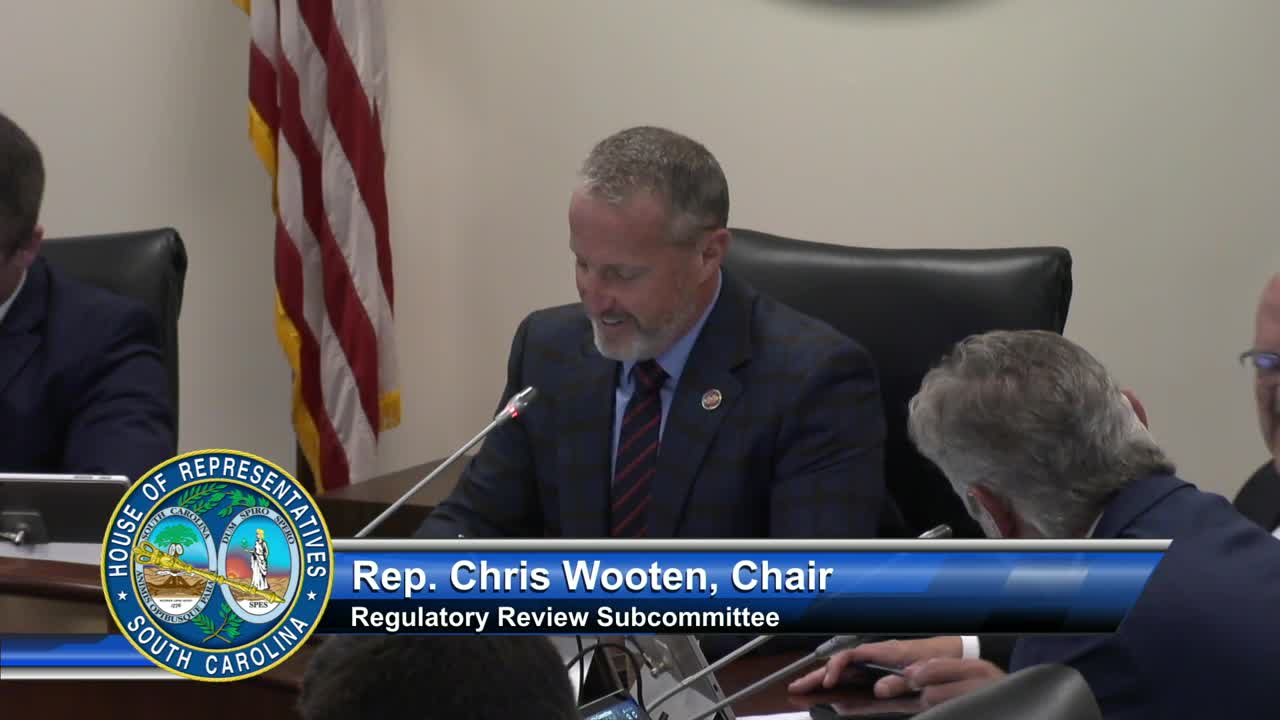Subcommittee pauses debate on bill to change rental/racing-cart age and oversight after safety concerns
Get AI-powered insights, summaries, and transcripts
Subscribe
Summary
The House Regulatory Review Subcommittee adjourned debate on Senate Bill 150 after extended testimony and a request from the Department of Labor, Licensing and Regulation for clearer terminology and safety standards; members instructed staff and agencies to draft revised language.
The House Regulatory Review Subcommittee paused debate on Senate Bill 150 after extended testimony from a track operator and South Carolina’s Department of Labor, Licensing and Regulation (LLR). The subcommittee voted to adjourn debate and reconvene to refine statutory language and oversight details.
Senate Bill 150 would amend sections of state law tied to amusement-ride regulation to exempt certain rental carts from LLR oversight and to allow individuals age 18 or older — and those age 15 or older with a valid driver's license or permit — to operate specified rental carts. The bill’s text defines a rental cart as an open-wheel motorsport vehicle capable of more than 40 mph that is not limited to operation within the containment system of a defined track; it also requires a restraint and rollover protection system for operators under age 18.
Michael Cummings, owner of Carolina Motorsports Park, described operational differences between large motorsports complexes and typical amusement-park karts, saying his facility uses covered wheels, bumpers, engine shields and rollover bars and that parents must sign waivers for minors. "What we're asking for is the decision for a 15 to 18 year old ... to be put ... in the hands of the parent where I think it belongs," Cummings told the subcommittee. He said his facility verifies age with permits or driver's licenses and that insurers such as K and K have industry practices that support younger drivers at certain facilities.
Representatives of the South Carolina Department of Labor, Licensing and Regulation, including Virginia Wetzel, governmental affairs director, and Duane Scott, program administrator for elevators and amusement rides, urged caution and asked lawmakers to use industry terminology and safety standards. Scott recommended replacing the term "rental cart" with the industry term "race kart" (or "racing kart") and noted the ASTM amusement-ride standard (cited as 2012 ASTM, designation F-2007 in testimony) defines race karts as vehicles designed for racing on tracks or streets rather than as concession amusement devices. He said race karts can be capable of speeds far in excess of 40 mph and that the existing statute as written would carve those vehicles out of LLR oversight unless the bill explicitly subjects them to regulation.
Committee members expressed concern that the bill’s current wording is broad and could be read to permit unregulated rental kart operations on private property or public roads without adequate safety requirements. The chair and members asked LLR to provide recommended statutory language, to identify terms that should be used ("race cart"/"racing cart") and to describe regulatory elements LLR would require if oversight were restored (examples discussed: containment systems, fire-extinguisher placement, rollover protection, restraint systems). The subcommittee passed a motion to adjourn debate on SB 150 to permit staff, LLR and sponsors to prepare revised draft language; no final passage or vote on the substantive policy was taken.
